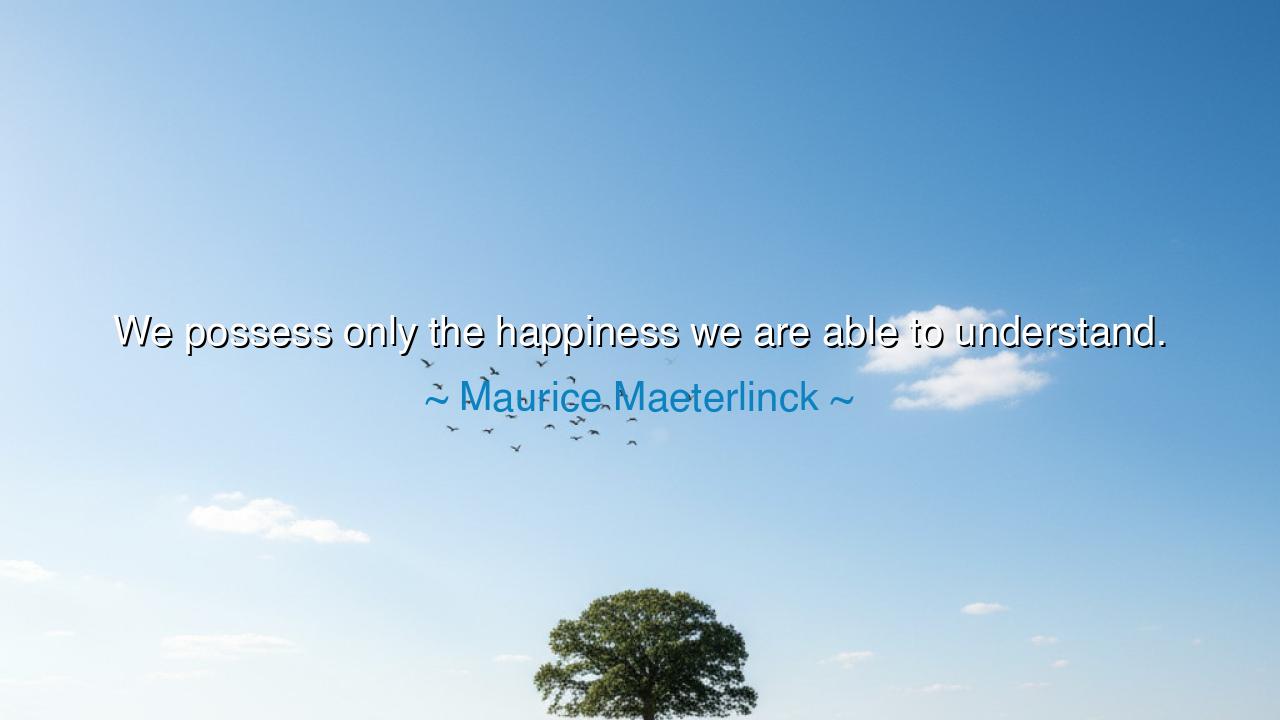
We possess only the happiness we are able to understand.






“We possess only the happiness we are able to understand.” — Thus spoke Maurice Maeterlinck, the Belgian mystic and poet of silence, whose words seem to rise not from the noise of the world, but from the still depths of the human soul. In this reflection, Maeterlinck reveals a profound truth: that happiness is not a gift bestowed from without, but a light awakened from within; and that its radiance depends not on circumstance, but on understanding. For what we do not understand, we cannot truly feel. And what we cannot feel, we cannot possess. Happiness, therefore, is not the fruit of fortune, but of awareness — a consciousness refined by reflection, wisdom, and depth of heart.
The origin of this thought lies in Maeterlinck’s lifelong search for the hidden currents that move human existence. A philosopher of the unseen, he believed that life’s greatest treasures — love, peace, and joy — are not found in outward abundance but in inward comprehension. He saw that the world is filled with simple blessings: light, friendship, work, rest, nature, and kindness. Yet many pass through these wonders without perceiving their worth. They live amid abundance and feel only emptiness, for they lack the inner eye to see the meaning of what surrounds them. Thus, Maeterlinck teaches that happiness is not measured by what we have, but by how deeply we understand what we have.
The child, for example, delights in a butterfly without knowing why; but the wise man, who has studied life’s brevity and beauty, feels in that same moment a thousandfold joy, for he understands what the child feels only unconsciously. Understanding expands the heart’s capacity for happiness. The more we comprehend the fragile miracle of life — its sorrows, its impermanence, its sacred balance — the more deeply we appreciate its every gift. Only through such awareness does happiness become not a fleeting pleasure, but a state of reverence. As Maeterlinck might say, the ignorant enjoy the surface of life; the wise drink from its depths.
Consider the life of Helen Keller, who, though blind and deaf, discovered a joy richer than many who see and hear. Her world was once darkness and silence, yet through patience, courage, and learning, she came to understand the meaning of words, touch, and human connection. And in that understanding, she found a happiness that transcended all physical limits. Her joy was not built on ease or abundance, but on awareness — the recognition that life itself, in its simplest sensations and relationships, was wondrous. She possessed only what she understood, yet what she understood was infinite.
Maeterlinck’s insight also warns us of a modern peril: that in our haste for pleasure, we forget to perceive. We chase distractions, mistaking them for happiness, while neglecting the quiet joys that require no wealth — a sunrise, a conversation, the breath of wind through leaves. We consume experiences but rarely comprehend them; we accumulate comforts but forget their meaning. Thus, our lives grow full yet our souls remain empty. To understand happiness, we must slow down and see life not as a race to be won, but as a mystery to be lived. Awareness turns the ordinary into sacred ground.
True understanding, however, demands courage. For to see life clearly is also to see its fragility, its sorrow, its impermanence. Many fear this clarity and flee into distraction, for they think that awareness brings pain. Yet it is the opposite: only through awareness do we discover gratitude. When we understand that every joy is fleeting, every breath a miracle, every friendship a grace, our hearts overflow with quiet happiness. The one who understands life’s fragility holds it more tenderly, and in that tenderness, finds peace.
So, my listener of the ages, remember this: your happiness will grow only as your understanding deepens. Do not seek joy in the noise of possessions or the applause of others, but in the quiet recognition of what already is. Look closely at the life around you — the faces you love, the air you breathe, the work of your hands — and ask what they mean. Reflect, give thanks, and learn to see. For happiness is not something you find; it is something you awaken to.
And when you awaken fully, as Maeterlinck teaches, you will find that joy is not a fleeting visitor, but a companion already dwelling within you — silent, patient, waiting to be understood. For in the end, we possess only the happiness we are able to understand, and understanding, my child, is the truest form of love.






AAdministratorAdministrator
Welcome, honored guests. Please leave a comment, we will respond soon